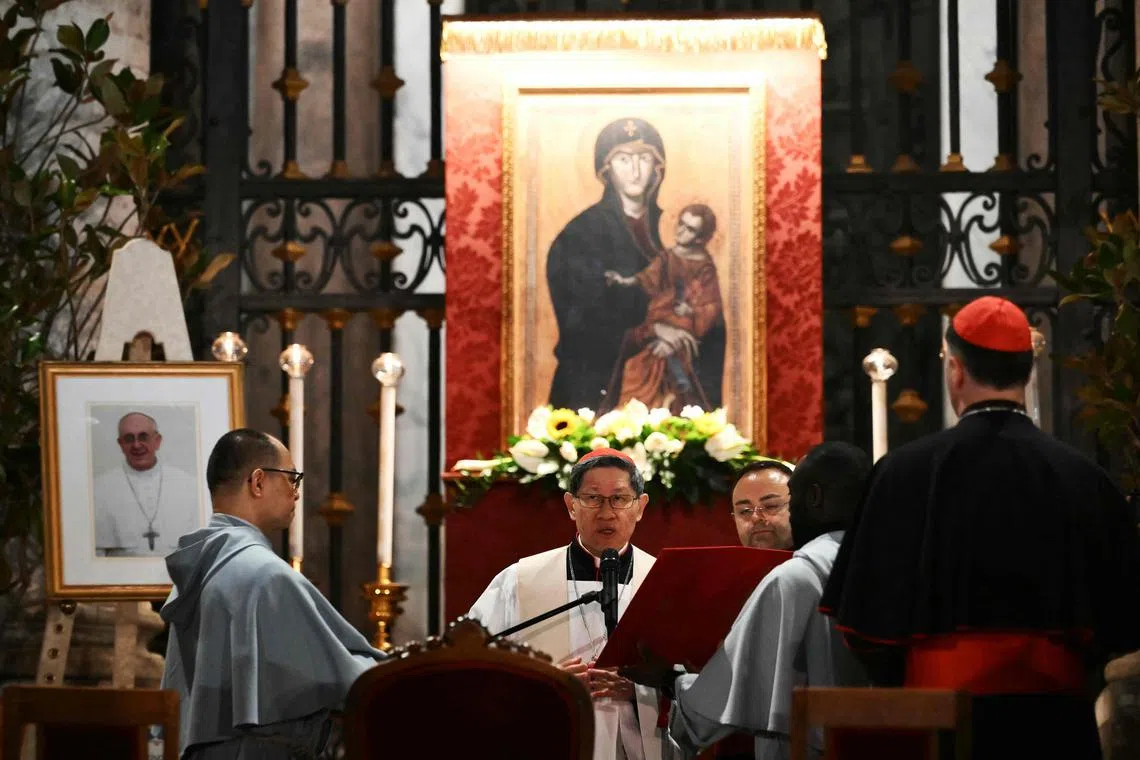Diplomacy likely to trump geography in choice of new pope
Sign up now: Get ST's newsletters delivered to your inbox

Filipino cardinal Luis Antonio Gokim Tagle (centre) officiates a rosary prayer next to a portrait of late Pope Francis at Santa Maria Maggiore Basilica in Rome on April 24.
PHOTO: AFP
Follow topic:
Vatican City - Pope Francis smashed the stereotypical profile for a pontiff, becoming the Catholic Church’s first leader from the Americas and the first non-European since the eighth century.
Some hope his successor, to be chosen in a conclave of cardinals in the coming days or weeks, could come from Africa or Asia.
The late Argentinian pontiff championed far-flung regions long overlooked by the Church, whether in his cardinal appointments or in his travels that strayed off the beaten path, from Mongolia to Papua New Guinea.
A non-European pope would make sense, given that Catholicism is growing in Africa and Asia, while church attendance is dropping and growth near-stagnant in Europe.
But in today’s increasingly complex world, analysts say an inclusive outlook and diplomatic skills will be key factors in the choice of the next pope, rather than a particular passport.
The Church’s first pope, St Peter, came from Galilee, in today’s Israel, yet the long line of pontiffs in his wake have been chiefly Italian.
Directly after being made pope on March 13, 2013, Francis joked that fellow cardinals had come “almost to the ends of the earth” to find him.
During his papacy, the former archbishop of Buenos Aires pushed the Church to be more inclusive of those from the so-called “peripheries”, whether geographical areas far from Rome, or long-ignored populations.
Through his trips abroad and outspoken advocacy of excluded groups like migrants and the poor, Pope Francis sought to bring new voices into the over 2,000-year-old institution.
He actively sought out those “overlooked or under-represented in the universal Church”, US historian of global religion R. Scott Appleby told AFP.
But he warned “that doesn’t guarantee, of course, that the next pope will be from the margins, from a country that’s not as well-known, or is not in Europe”.
Mr Appleby called it a “fool’s game” to try to predict the next pope’s nationality.
Political ‘counterpoint’
Those betting on a non-European pope point to the fact that Pope Francis has named the majority of the cardinals who will choose his successor, with many from under-represented regions.
But Europe still has the largest voting bloc, with 53 cardinals, compared with 27 cardinal-electors from Asia and Oceania, 21 from South and Central America, 16 from North America and 18 from Africa, according to the Vatican.
Some of those touted to succeed Pope Francis also hail from outside the Church’s traditional bastions of power – notably Manila’s Luis Antonio Tagle or Ghana’s cardinal Peter Turkson.
Cardinals from Myanmar and the Democratic Republic of Congo are also cited as contenders, in an admittedly wide field.
A pope from a poorer country brings a different perspective that would stand out in a world of strong and vocal Western leaders.
Such a pontiff would have “a first-hand experience of the poor… a country in a region that is not ‘in the game’,” Mr Appleby said.
“And that lends a counterpoint to what have been the power centres on the political front. It’s important for the Church to not simply replicate the power centres of the world.”
Professor Roberto Regoli, an Italian historian at the Pontifical Gregorian University, added that the conclave will be looking “for a cardinal capable of being a point of reference for many, according to different sensitivities”.
‘World on fire’
But experts agree that a papal contender’s ability to unite the Church in an increasingly fractious geopolitical context may be the central deciding point.
“The new pope will have to redesign the Church in a world on fire,” professor of the history of Christianity Alberto Melloni told the Corriere di Bologna newspaper this week.
Professor Francois Mabille, director of France’s Geopolitical Observatory of Religion, said if cardinals decide geopolitics is the “criterion of choice”, the Vatican’s current chief diplomat, Cardinal Pietro Parolin, “may fit the bill perfectly, even if European and Italian”.
Mr Appleby concurred: “It’s hard to imagine that the next pope can ignore the tumult and the challenges in the world.
“They’ll be thinking: ‘Boy, the world’s in crisis... Who among us can emerge as someone of the proper charisma and talent to lead the Church at this point?’” AFP

